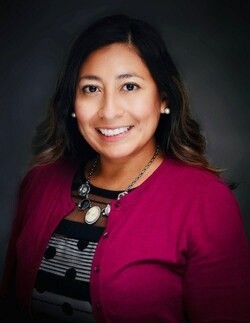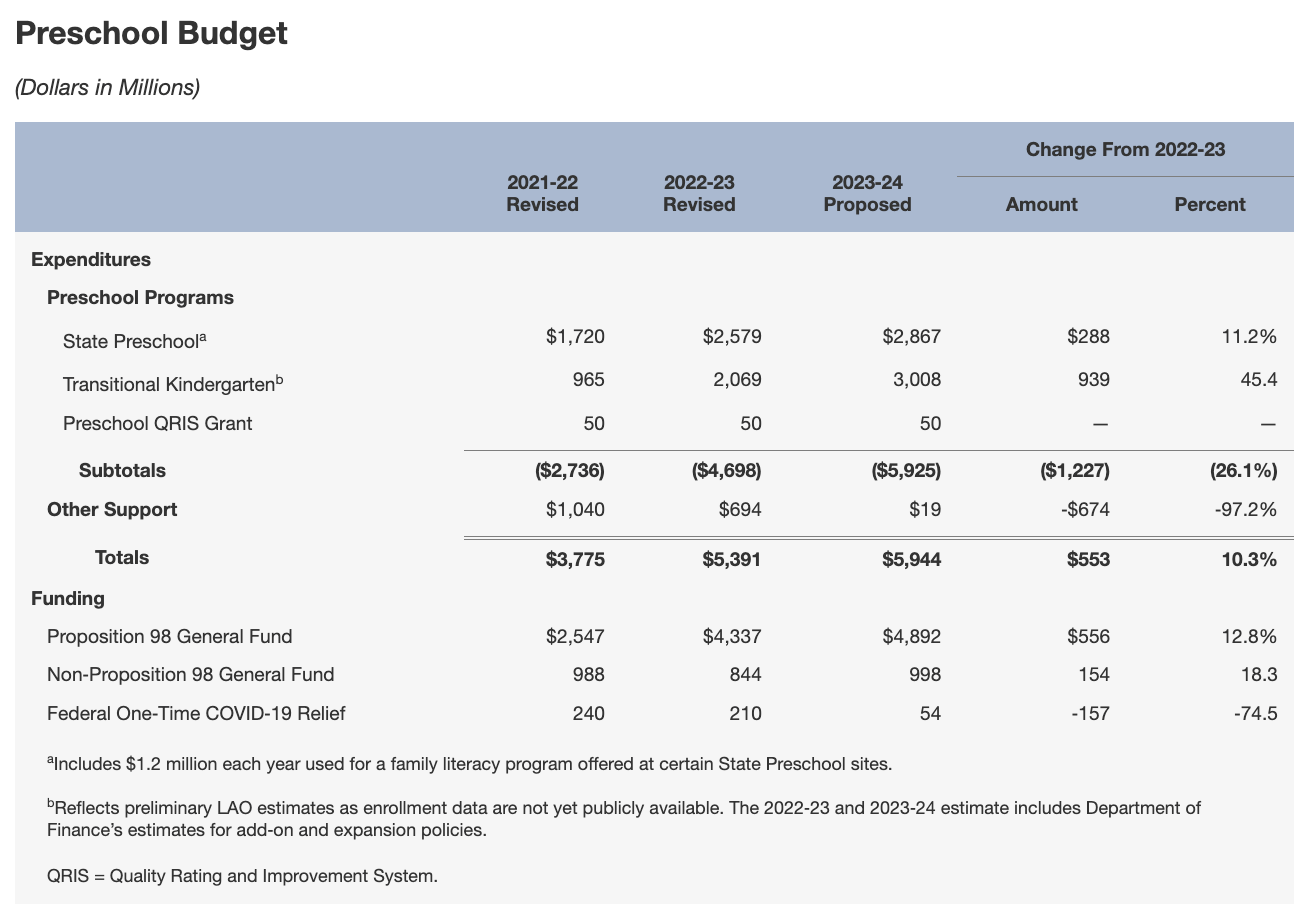How does California's Pre-K education system work?

California steps up to a big jump in early learning
Early education is vital for all children, but not yet available to all. Last year, the state of California began a major effort to do something about this by rolling out a multi-year, $2.7 billion effort to expand preschool and transitional kindergarten to eligible students.

Sara Bachez
First Five California
It has never been a more critical time for parents to be part of the development of a cohesive, comprehensive system.
Why is early learning critical to a child’s life?
By age 5, 90% of a child’s brain is fully developed, making the first years of life critical. During these early years, children develop language skills, process new experiences, and — with guidance — learn to manage and regulate behavior and emotions.
Child care and prekindergarten programs provide children with experiences that help them learn how to respond and act in different situations in life. Studies show that participation in early learning environments can lead to big positive outcomes:
|
Positive outcomes associated with early learning |
|---|
|
Higher test scores |
|
Better performance in reading and math |
|
College attainment |
|
Reduced teen pregnancy |
|
Improved mental health |
|
Lower risk of heart disease in adulthood |
|
Longer life span |
The benefits of good quality early education are well-known, but unequally available. The pandemic disrupted existing systems and made gaps worse. The State's plan to invest in child care and universal Pre-K education is both exciting and challenging.
How is early learning delivered? Through a mixed approach.
Early learning programs vary a lot, but come in three main forms:
- Home-based settings such as licensed family child care and license-exempt Family, Friend, and Neighbors caregivers;
- Center-based child care and preschool in community-based settings;
- School-based Preschool and Transitional Kindergarten (TK).
This three-part system is sometimes called a mixed delivery approach. The effort to provide early education to all California children is known as Universal Pre-K or UPK. Transitional Kindergarten or TK refers specifically to public preschool for children who aren’t yet age-qualified to attend public kindergarten in California. As California’s public early education program expands, the specific age requirements will include children at earlier ages:
|
Transitional Kindergarten Expansion Schedule (2023-24 budget) |
|
|---|---|
|
Year |
Eligibility |
|
2021-22 |
Fifth birthday btw. Sept. 2 and Dec. 2 |
|
2022-23 |
Fifth birthday btw. Sept. 2 and Feb. 2 |
|
2023-24 |
Fifth birthday btw. Sept. 2 and April 2 |
|
2024-25 |
Fifth birthday btw. Sept. 2 and June 2 |
|
2025-26 |
Fifth birthday by Sep. 1 |
These programs, supported by a combination of public and private funds, facilitate a healthy network of providers diverse enough to meet community and family needs. What began in 1988 as a 50-cent tax on cigarettes now includes Proposition 98 state education funding, state or federal contracts and grants, state vouchers, and private family fees and tuition.

What is First 5?
First 5 California is a state agency dedicated to the support of children through age five. Created by California voters with the passage of Proposition 10 in 1988, the mission of First Five is to promote a coordinated system for California’s children prenatal through 5 and their families.
A major goal of First 5 California is to make sure that every parent, especially those who are living in poverty, receives important information about the early development of their babies' brains during the first months and years of life. First Five provides comprehensive information to parents about what they can do to improve their children's physical, emotional, and educational well-being and future.
As the voice of families with children ages 0 through 5, First 5 California supports a fully funded, integrated system that provides learning opportunities for California’s diverse families through a variety of settings, recognizing that California families vary in structure, size, cultural priorities, and linguistic needs. To support coordination among the many participants in this system, First Five California commissioned a study to provide insights and recommendations to state policymakers.
What are the open issues?
As California embraces a strategy to provide all children with effective early learning opportunities through a mixed-delivery system, we should expect challenges. New teachers will need to be recruited and trained in significant numbers, which is never easy. Measures of success will need to be developed, tested and rolled out. Facilities will need to be adjusted or constructed. For more details about some of the issues, read the recent paper California’s Major Investment in Universal Transitional Kindergarten by Alix Gardiner, writing for PACE.
How can parents get involved?
First Five operates through a network of local county commissions that oversee the allocation of funds and the implementation of services within their respective areas. Wherever you live in California, a First 5 county commission is there to help you. These 58 commissions fund local service providers, health and learning programs, and resources tailored to meet the needs of your family and community.
Parents need affordable access to safe, stable, nurturing environments for their young children. Therefore, their voices need to be heard at the local, state, and federal levels to ensure that school districts and ECE providers work together to develop and provide comprehensive learning programs that offer full-day instruction and wrap-around services.
|
Questions for parents to ask |
|---|
|
What is the district’s plan to expand TK? |
|
How is the community expanding child care to meet the needs of children and families? |
|
Will child care facilities be available at school sites? |
|
Will staff compensation be adequate to live in our community? |
|
Will all of our children have opportunities for early learning? |
While First 5 California’s message has always been near and dear to my heart, as a new mother, I have never felt more connected to the 0 to 5 mission or more steadfast in my commitment to the work that we do. I realize that my husband and I are our daughter’s first and most important teachers and advocates. We are building the foundation for who she will become. I have learned that we are vital to her growth and development, and that her experiences will shape her life.
Our organization serves as a state leader and partner in creating meaningful impact in the lives of our state’s youngest children and their families. We are focused on meeting children’s needs by building bridges between state systems and programs, uplifting promising practices, and promoting inclusive, developmentally-appropriate efforts to ensure every child has the best start in life.
Online help for parents
There are many resources available to support parent engagement in the areas of child health, education, literacy, child development, and smoking cessation. One function of First Five California is to help parents discover those resources, which we have assembled in a useful Parent Guide.
We encourage all parents and caregivers to browse by their child’s age group—Newborn, Baby, Toddler, or Preschool—to check developmental benchmarks and instantly access a wide variety of parenting tips, articles, instructional videos, and activities. The First 5 California Parent Site also serves as a resource tool for families seeking up-to-date information, services, and programs.
 Sara Bachez became Deputy Director of the External and Governmental Affairs Office of First Five California in 2022. In this role, she oversees legislative, policy, public relations, and communications initiatives and staff. Prior to joining First 5 California, Sara served as the Chief Governmental Relations Office for the California Association of School Business Officials (CASBO). Sara began her career in public policy as a budget consultant for the Assembly Budget Committee. She earned her Bachelor of Arts degree from the University of California, Berkeley in the field of Mass Communications, and her Master of Business Administration degree from California State University, Sacramento.
Sara Bachez became Deputy Director of the External and Governmental Affairs Office of First Five California in 2022. In this role, she oversees legislative, policy, public relations, and communications initiatives and staff. Prior to joining First 5 California, Sara served as the Chief Governmental Relations Office for the California Association of School Business Officials (CASBO). Sara began her career in public policy as a budget consultant for the Assembly Budget Committee. She earned her Bachelor of Arts degree from the University of California, Berkeley in the field of Mass Communications, and her Master of Business Administration degree from California State University, Sacramento.Tags on this post
All Tags
A-G requirements Absences Accountability Accreditation Achievement gap Administrators After school Algebra API Arts Assessment At-risk students Attendance Beacon links Bilingual education Bonds Brain Brown Act Budgets Bullying Burbank Business Career Carol Dweck Categorical funds Catholic schools Certification CHAMP Change Character Education Chart Charter schools Civics Class size CMOs Collective bargaining College Common core Community schools Contest Continuous Improvement Cost of education Counselors Creativity Crossword CSBA CTA Dashboard Data Dialogue District boundaries Districts Diversity Drawing DREAM Act Dyslexia EACH Early childhood Economic growth EdPrezi EdSource EdTech Education foundations Effort Election English learners Equity ESSA Ethnic studies Ethnic studies Evaluation rubric Expanded Learning Facilities Fake News Federal Federal policy Funding Gifted Graduation rates Grit Health Help Wanted History Home schools Homeless students Homework Hours of opportunity Humanities Independence Day Indignation Infrastructure Initiatives International Jargon Khan Academy Kindergarten LCAP LCFF Leaderboard Leadership Learning Litigation Lobbyists Local control Local funding Local governance Lottery Magnet schools Map Math Media Mental Health Mindfulness Mindset Myth Myths NAEP National comparisons NCLB Nutrition Pandemic Parcel taxes Parent Engagement Parent Leader Guide Parents peanut butter Pedagogy Pensions personalized Philanthropy PISA Planning Policy Politics population Poverty Preschool Prezi Private schools Prize Project-based learning Prop 13 Prop 98 Property taxes PTA Purpose of education puzzle Quality Race Rating Schools Reading Recruiting teachers Reform Religious education Religious schools Research Retaining teachers Rigor School board School choice School Climate School Closures Science Serrano vs Priest Sex Ed Site Map Sleep Social-emotional learning Song Special ed Spending SPSA Standards Strike STRS Student motivation Student voice Success Suicide Summer Superintendent Suspensions Talent Teacher pay Teacher shortage Teachers Technology Technology in education Template Test scores Tests Time in school Time on task Trump Undocumented Unions Universal education Vaccination Values Vaping Video Volunteering Volunteers Vote Vouchers Winners Year in ReviewSharing is caring!
Password Reset
Search all lesson and blog content here.
Login with Email
We will send your Login Link to your email
address. Click on the link and you will be
logged into Ed100. No more passwords to
remember!














Questions & Comments
To comment or reply, please sign in .
Albert Stroberg May 30, 2023 at 10:24 am
Jeff Camp - Founder June 5, 2023 at 12:00 pm
I am also a fan of programs that directly train and prepare new parents on positive parenting techniques -- some hospitals, preschools and school communities do this work proactively and well, but for that kind of training the earlier the better!